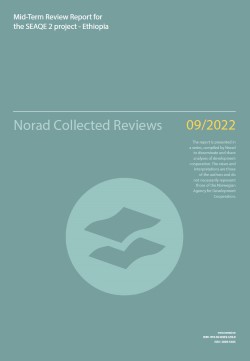Mid-Term Review Report for the SEAQE 2 project - Ethiopia
About the publication
- Published: August 2022
- Series: Norad Collected Reviews
- Type: --
- Carried out by: --
- Commissioned by: --
- Country: --
- Theme: --
- Pages: 44
- Serial number: 09-2022
- ISBN: 978-82-8369-139-9
- ISSN: 1894-518X

Several high-level findings have been extrapolated. These are:
• The barriers facing girls are likely to have been exacerbated due to Covid-19. Overall, changes made to the project because of Covid-19 were relevant but not sufficient to support those that experience significant marginalisation an opportunity to return to school once schools reopened. For instance, head teachers and education authorities noted that children who experience marginalisation did not return to school. This included children from remote areas, children from poor households, girls and children with disabilities.
• Female students performed lower than male students in the TVET and Grade 10 assessments, especially in numeracy. The results are statistically significant with a high confidence value indicating that this result may be reflective of the situation in TVET and secondary schools in Ethiopia. Whilst consistent with baseline findings, the findings indicate that female students in Grade 10 and lower need additional support in Mathematics and would also benefit from support in Literacy, to ensure they can access future employment and education opportunities.
• Students had a positive association with their school and their teacher. This was also a finding in the baseline and indicates that barriers to learning and education continuity may not be school based.
• The door-to-door campaign was a successful strategy for identifying and supporting the enrolment of OOSC and children with disabilities (this strategy was also used in Somalia).
• Setting up girls’ clubs, running a girls education campaign and holding information sessions with parents as well as building toilets and a separate hand washing station for girls were all identified as strategies employed to support girls to return to school. It is unclear what interventions are happening within the school to support children with disabilities beyond
teacher training.
• Most partners agreed (11) or strongly agreed (7) that the changes to the school environment worked to support children’s learning and were suitable for schools to be safe learning environments.
• Attention has been paid to teacher wellbeing but not in a deliberate focused manner that responds to the key issues that may be affecting teachers.
• Coordination between ADRA and its partners was compromised by Covid-19. One in five partner respondents disagreed that they received good support from ADRA (no explanation for this rating was provided).
